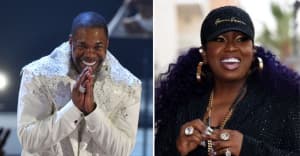The video for Missy Elliott’s homecoming single “WTF (Where They From)” pulls off a very difficult challenge—it feels like a natural extension of her past work, while still being creatively fresh. Much of that is to the credit of Dave Meyers, the clip’s director and one of Missy’s most trusted collaborators. Meyers, a veritable legend of the form, has played a very crucial role in her creative output, directing pretty much all of her visuals since 2001's “Get Ur Freak On.” That includes momentous videos like “One Minute Man,” “Gossip Folks,” “Lose Control,” and “Pass That Dutch.” The pair reunited, along with choreographer Hi Hat, for “WTF ” and created a video that fits snugly into Missy's already memorable canon.
Meyers, who is currently filming a commercial in South Africa, caught up with The FADER over the phone on Thursday night and said that the shoot was like “a reunion tour.” The main difference between shooting this clip and past efforts came down to one thing—the budget.
“Times have changed, and it was about half the budget of what we usually work with,” Meyers said. “We certainly knew right off the bat that the audience doesn't give a crap and they want to make sure it’s that progressive Missy and doesn't really want to hear anything about money. So it became a really clever production to deliver as best as we could, the high-caliber experience that Missy videos deliver.”
Below, our chat with Meyers about the difficulty of working with marionettes, the feeling of being snubbed at the VMAs, and what it’s like working with Missy after all of these years.
You’ve shot over 10 videos for Missy. How was this one different from working with her before?
We've done pretty much everything since "Get Ur Freak On," but I think it was a reunion tour. We had gone off into the world each in our own directions—Missy and I, and the choreographer [Hi Hat]—and had our own journey. Then this is like getting the troops all rallied up again. It was really exciting, especially since the Super Bowl kind of kicked it off. When I saw her at the Super Bowl, I was just kind of like, "Oh yeah. She's going to come back," and then I got the call.
How did the treatment come together?
Missy had the idea of puppets, she's used some puppet stuff and they inspired her and she wanted to make puppets, and Pharrell wanted to make puppets. So it was a puppet video for the first month of creative. We were looking into the puppet world and how long that takes. [Making puppets] takes much longer than what you usually get for a video, so once we got over the hurdle and got those in the pipeline of being made, the VMAs happened, and Missy and I were reminiscing about all the VMAs we've won, and when we're on stage together for Video of the Year, and we were just sort of vibing with each other like, "Maybe the puppet idea isn't enough."
Both of us have a little bit of ADD. A lot of the charm of our formula, if you want to call it that, our magic, if you will, is we constantly change the theme and keep it moving, and we both get tired of setups after a certain length of time. I hit her the next morning with the rest of the treatment: "So what about a mirror Missy, what about a two-face Missy, what about the dancers popping out of boxes," and all this kind of stuff. She's like, "Yeah love it, let's do it." Then it became what it was.
How was working with the marionettes?
The way the puppets work is there's a guy who makes them, and that’s a whole science, and then there’s a guy who fixes them and adjusts them and then there’s the puppet master, who brings life to them. That guy was someone different, that we found in New York. He was very spiritual about the way that the puppets channeled through him and he gave a little nuanced personality to each one. It was an interesting process because they were completely different skill sets and completely different disciplines, if you will.
Do you think that taking time off changed Missy creatively?
Yeah. She was very reachable, she was very excited, and she was very ready to come back. She felt the love from the Super Bowl and wanted to move back into the hemisphere, like an encore or like the world was calling out her name. There was a lot of really beautiful energy from her. I think she has matured.
At the core, the only real difference was that when we last worked together there wasn't really social media and now there is and that means working closely and privately and trying to keep everyone out of our hair. That was the only really new thing, the actual visuals and the way we created were similar to how we always create, and the back and forth of trying to be each other's worst—or not worst—critics. If I hit her with an idea and she thinks another person already did it, she's like "So-and-so did that." And if she hits me with something and I'm like "Nah, I think someone did that," whatever it is, we just go back and forth until it feels like we have it.
Does social media play into your creative process at all, or her creative process? These days, many videos feel very conscious of the memes they go on to create.
[Because of social media,] it’s a little more intense on making sure you're not copying someone. Not that we ever did, we were just vetting things because it’s very quick that people can put together references and figure out where stuff comes from. Missy has been gone so long that she couldn't afford—and nor could I, with my history with her—to have any sort of comparisons. Or for her to come second behind some artist who did something that was clever or whatever. So there was just a very pointed effort to try to keep all the ideas at least to the best of our knowledge fresh and different and I think as well her release she really kept it pretty secret, nobody could see the video until pretty much a week ago, but we shot it a while ago.
Do you think videos have a bigger impact in the social media age? That they're more popular now?
The reaction’s not any bigger. I mean, the videos couldn't have been any bigger than when I was in videos at the time of [MTV's] TRL and Making the Video. It got to a point where people recognized me on the street! So I don't think that social media necessarily is bigger. It’s just more direct. You have a very direct correlation with your fans. I think that’s something I’ve been starved for, because especially when it was TRL and MTV, you just had screaming fans like, "Wahhh, I love you! I love the video because Eminem is the best." That’s not really— is that a real critique?
Although it’s wonderful that there are such die-hard fans out there, but I think what’s nice about social media is that the people who specifically follow me are somewhat interested in what I'm doing, and different people follow celebrities I work with, so you end up having a very specific audience that hopefully has some interest in what you're doing. You can engage with that now, which is a very personal, creative element to add to the whole thing. I think in a way it creates a more creative community. I think the stakes are higher to be creative, and I appreciate that.
At the VMAs this year, there was kind of some level of frustration with the fact that directors were excluded from the ceremony and the stage. Do you have any thoughts on that?
I'm surprised that this is the year it came up. It's been about 25 years in the making from MTV—they've excluded directors forever, to the point that I don't even go [to the VMAs] anymore. I have a big chip on my shoulder that I think a lot of directors have. I won Video of the Year for Katy Perry, but they made me pay for my ticket and then they argued with me about whether I could have a Moonman. I got it, but it’s very disrespectful the way MTV treats directors.
From my perspective, I was actually quite honored that Taylor Swift made an opportunity for ["Bad Blood" video director] Joseph [Kahn] to speak at the podium. I think the last director I saw speak at the podium was Dayton Ferris when he won for the Red Hot Chili Peppers video in 1997 or something. I remember it distinctly because it was shocking that they let a director on stage and I was all excited. There was a couple of years where they sat the directors next to the artist and then MTV got the idea to section off the celebrity seats for camera, and it just became a really awful live show to attend. I mean if you're a star it’s all the same, but from a directing perspective, it was very noticeably not about the creative effort or achievement that you participated in. I think that’s a longstanding complaint, that any director would probably openly talk about.
Why do you think your and Missy's styles have meshed so well?
I think that we have the same interests and the same appetite and the same reference base. The things that she likes are the same things I like. Even if we're from different walks of life, our circles overlap in the creative atmosphere quite heavily. She finds the same things funny that I find funny, she has an appetite for crazy visuals, I have an appetite for crazy visuals, and then I think she's a larger than life personality and I compliment her by being kind of recipient or host to that persona. I know how to respect it and work in a way that I guess she feels comfortable working.
And to be honest, when I get the call I seize the creative opportunity. I don't always expect the next call. You’ve got to always treat everything like your first is your last. You'd have to ask Missy but presumably she respects that discipline and respects that I'm always trying to do my best with each video and never sleeping on her records, always trying to do something new. I'm always supportive of her ideas and I'm very collaborative. She probably appreciates that, but that's a question ultimately for her.
Is a video with a budget like “Get Ur Freak On” just completely unthinkable now?
Yeah, pretty much. The only artist I’ve ever heard of spending that kind of money, and I think it’s out of her own pocket, is Taylor [Swift]. I think that she gets the bigger picture of how much branding is involved in a video, and I think she's offering her fans an experience that she's capable of doing because of the success that she's earned.
I think that it’s beautiful when an artist prioritizes that. For me that happened this year with Missy, and also with Ciara, where the artists are themselves making something happen and it’s not just the record label. It’s an interesting climate they're in, and it’s definitely evolved from the "Get Ur Freak On" days—or devolved, financially. But I think it’s evolved, creatively, or it can. I'm sure there’s a whole bunch of average videos—I don't know what the current collective feeling is on the videos out there. But from my perspective I see more and more creative stuff every day. It has a different level of spectacle. I don't see spectacles every day, but I see clever every day and I see innovative new things. It’s a very stimulating climate to be doing videos in. It’s an interesting era to be doing music of any sort, because you can't afford not to be clever.


